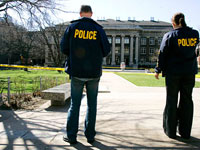Headquarters of powerful Sunni group seized in Baghdad
The Iraqi government cordoned off the building and seized the west Baghdad headquarters of a powerful Sunni Muslim group. They accuse the group of supporting al-Qaida.

The Association of Muslim Scholars, a hardline Sunni clerics group with links to insurgents, has its headquarters in the Um al-Qura mosque in the capital's Sunni-dominated Ghazaliyhah neighborhood.
Iraqi security forces dispatched by the Sunni Endowment, a government agency that cares for Sunni mosques and shrines, surrounded the mosque complex at 9 a.m. Wednesday and demanded that the building be evacuated before noon, the association said in a statement posted on its Web site.
Employees were told to remove all personal belongings and even haul out furniture, that troops said would be destroyed if left behind, it said.
The group also operates a radio station from the mosque, and its transmission was cut as well, the statement said. The final sounds on the air were of an announcer apologizing to listeners and telling them he was being forced out of the building, the group said.
The head of the Sunni Endowment held a news conference at the mosque later Wednesday, accusing the clerics group of supporting al-Qaida.
"The Association of Muslim Scholars has regrettably been attacking any tribal awakening, resistance or worshippers whenever they form a force to purge their neighborhoods of al-Qaida elements. The association has always justified killing and assassinations carried out by al-Qaida," Ahmed Abdul-Ghafoor al-Samarraie, the Sunni Endowment chief, told reporters.
"The association no longer has a place here...These headquarters now belong to the Sunni Endowment," he said.
Earlier, another Sunni Endowment official said the government had plans to renovate the Um al-Qura mosque, which sits on government property.
"We have nothing against the association...and its members, but we have plans to renovate the mosque and construct more buildings inside," the official said on condition of anonymity because he was not authorized to speak to media.
"However, this matter has been seen by the association as a threat to their existence in the mosque," the official said.
The association has long opposed the U.S. military presence in Iraq and has often been at odds with the Shiite-backed government. The association spearheaded the Sunni boycott of the January 2005 elections, which fueled the insurgency.
Another statement posted on the association's Web site said the group held al-Samarraie himself responsible for the safety of its employees.
"The Association of Muslim Scholars condemns this blatant assault...This was done forthe benefit of many parties which see the association as an obstacle to their projects," the statement said.
A spokesman for the association, Mohammed Bahsar al-Faydi, told The Associated Press that he believed the troops raiding the mosque were not government forces but al-Samarraie's personal guards.
"We don't understand why the Sunni Endowment acted this way," said al-Faydhi, who lives in Jordan.
Some employees who were already inside the Um al-Qura building when forces arrived staged a sit-in, refusing to leave by the noon deadline, the association said. Security forces were preventing any vehicles from entering the compound, it said.
Before noon, a bulldozer pulled up and wrecked a huge sign etched with the name of the scholars' group, the statement said.
Meanwhile, police said two bombs exploded on opposite sides of Baghdad on Wednesday, killing at least three civilians.
The first was a roadside bomb, which blew up next to a U.S. military patrol near the Green Zone and killed at least two civilians, police said. The explosion shook central Baghdad around 8 a.m., and many residents believed it was a truck bomb, because of the magnitude of the blast.
Rear Adm. Gregory, director of the Multi-National Force-Iraq's communications division, told reporters there were "multiple military and civilian casualties" but offered no specifics.
Police said the incident occurred in the Salihiyah area on the west side of the Tigris River, across from a security gate leading into the U.S.-guarded Green Zone. Shortly after the attack, a security cordon was set up and cameras barred from the area.
Three others were also wounded, police said.
Hours later, a car bomb exploded in northeastern Baghdad, killing one civilian and wounding seven others, police said.
Also Wednesday, a suicide bomber exploded his explosive vest inside the guest house of an anti-al-Qaida sheik, Amar al-Gartani, killing two people and wounding six near Iskandiriyah, 50 kilometers (30 miles) south of Baghdad, provincial police said.
Al-Gartani was not injured, police said.
Meanwhile, clashes were under way in two villages - one Shiite and one mixed - east of Baqouba, Diyala's provincial capital.
Police said al-Qaida in Iraq used to control both villages, but that U.S. and Iraqi forces forced them out a few weeks ago. About 40 displaced families had begun to return to their homes, when al-Qaida attacked early Wednesday, trying to reclaim the area, police said.
Five people were killed - two civilians and three al-Qaida members - and six others injured in the fighting, police said.
Subscribe to Pravda.Ru Telegram channel, Facebook, RSS!





